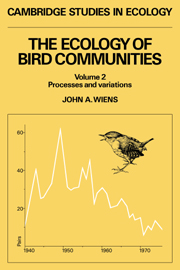Book contents
- Frontmatter
- Contents
- Preface
- Acknowledgments
- Part I Interpreting community patterns: process hypotheses
- 1 Competition
- 2 A case study: interactions among nectarivores
- 3 Beyond competition: other factors influencing community structure
- Part II Community variation in time and space
- Part III Prospects
- References
- Author index
- Subject index
1 - Competition
Published online by Cambridge University Press: 18 December 2009
- Frontmatter
- Contents
- Preface
- Acknowledgments
- Part I Interpreting community patterns: process hypotheses
- 1 Competition
- 2 A case study: interactions among nectarivores
- 3 Beyond competition: other factors influencing community structure
- Part II Community variation in time and space
- Part III Prospects
- References
- Author index
- Subject index
Summary
The most frequently offered explanation of the patterns of communities is that they are products of interspecific competition, acting either contemporaneously or in the past. Writing in 1975, Ricklefs stated that ‘few ecologists doubt that competition is a potent ecological force or that it has guided the evolution of species relationship within communities’ (1975: 581), and, in his more recent review, Giller (1984) attributed most of the community patterns he discussed to competition. The challenges that have brought controversy to community ecology have centered largely on whether or not competition produces the patterns we see and how applicable a good deal of competition theory is to nature.
It is important to distinguish between the process of competition and its application as an explanation of community patterns. When Brown (1981) wrote that he found competition theory ‘a disappointment’, he was concerned with the theory and its application, not the process itself. Competition theory applies the process of competition under specified conditions to predict community patterns. If the predictions fail to match observations, it is not because the process is flawed but because the theory is incorrect or has been misapplied. The challenges to the competition paradigm have questioned the simplicity of the theory and its overly enthusiastic or illogical applications, not the reality of the process itself. There is nothing about the process of competition, as an interaction among individuals, that requires equilibrium or optimization or precludes opportunism, nonequilibrium, or stochastic influences. The notion that equilibrium and optimization are associated with competition derives from conventional applications of the theory that predict population-level consequences of the interactions, usually in the framework of the Lotka–Volterra equations.
- Type
- Chapter
- Information
- The Ecology of Bird Communities , pp. 3 - 63Publisher: Cambridge University PressPrint publication year: 1989



